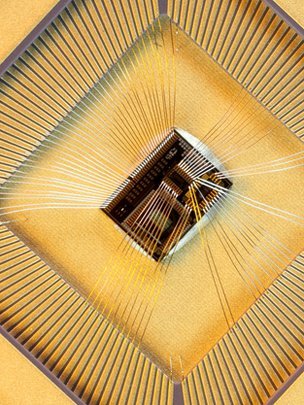Microchip can suppress appetite and helps cut obesity


Animal trials of the electronic implant are about to begin and its makers say it could provide a more effective alternative to weight-loss surgery
An “intelligent” microchip which can suppress appetite has been designed by a group of British scientists.
Animal trials of the electronic implant are about to begin and its makers say it could provide a more effective alternative to weight-loss surgery.
The chip is attached to the vagus nerve which plays a role in appetite as well as a host of other functions within the body.
Human trials of the implant could begin within three years, say its makers.
The work is being led by Prof. Chris Toumazou and Prof. Sir Stephen Bloom of Imperial College London.
It involves an “intelligent implantable modulator”, just a few millimetres across, which is attached using cuff electrodes to the vagus nerve within the peritoneal cavity found in the abdomen.
The chip and cuffs are designed to read and process electrical and chemical signatures of appetite within the nerve. The chip can then act upon these readings and send electrical signals to the brain reducing or stopping the urge to eat.
The researchers say identifying chemicals rather than electrical impulses will make for a more selective, precise instrument.
The project has just received over 7 million euros ($9 million) in funding from the European Research Council.
A similar device designed by the Imperial team has already been developed to reduce epileptic seizures by targeting the same vagus nerve.
“This is a really small microchip and on this chip we’ve got the intelligence which can actually model the neural signals responsible for appetite control,” Prof. Chris Toumazou said.
“And as a result of monitoring these signals we can stimulate the brain to counter whatever we monitor.
“It will be control of appetite rather than saying don’t eat completely. So maybe instead of eating fast you’ll eat a lot slower.”
Prof. Chris Toumazou said initial laboratory trials had already demonstrated proof of concept.
Prof. Stephen Bloom, who heads Imperial’s diabetes, endocrinology and metabolism division, said the chip could provide an alternative to “gross surgery”.
Recent Posts
Happy New Year 2025: Sydney Welcomes New Year with Fireworks Display
Sydney has welcomed 2025 with a spectacular fireworks display - cheers erupted as the clock struck midnight…
Brad Pitt and Angelina Jolie Reach Divorce Settlement After 8 Years
Following an eight-year legal battle, Angelina Jolie and Brad Pitt have reached a divorce settlement,…
Former US President Jimmy Carter Dies at 100
Former President Jimmy Carter died on December 29 at the age of 100 after spending several…
Georgia: Outgoing President Salome Zourabichvili Refuses to Step Down After Mikheil Kavelashvili’s Inauguration
Georgia’s outgoing president Salome Zourabichvili refused to step down on December 29, saying she was…
Bald Eagle Officially Designated America’s National Bird After 250 Years
The bald eagle has been officially declared the national bird of the United States, after…
Kazakhstan Plane Crash: Dozens Survive Azerbaijan Airlines Plane Crash Near Aktau Airport
Dozens of passengers have survived a crash involving a plane carrying 69 people in Kazakhstan,…